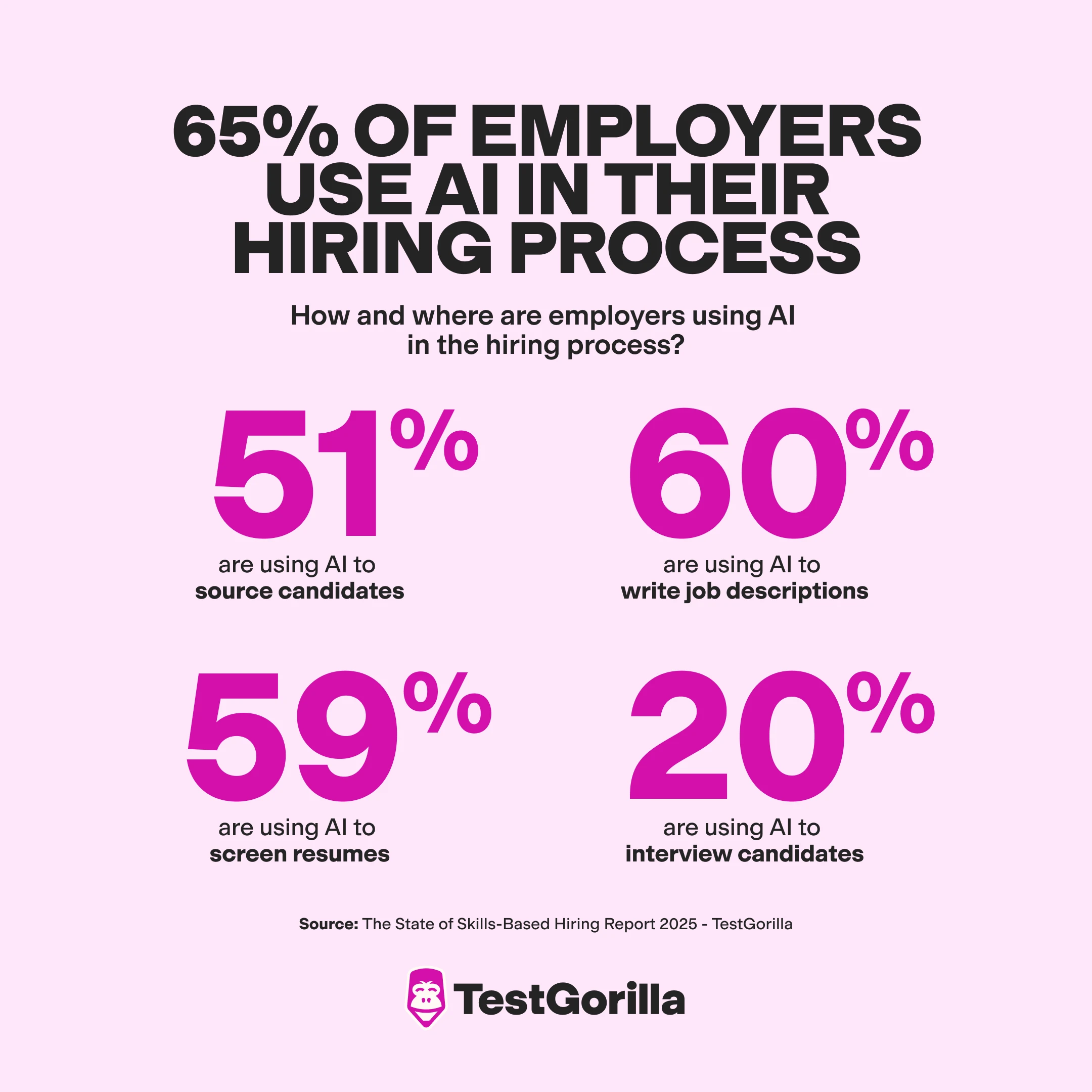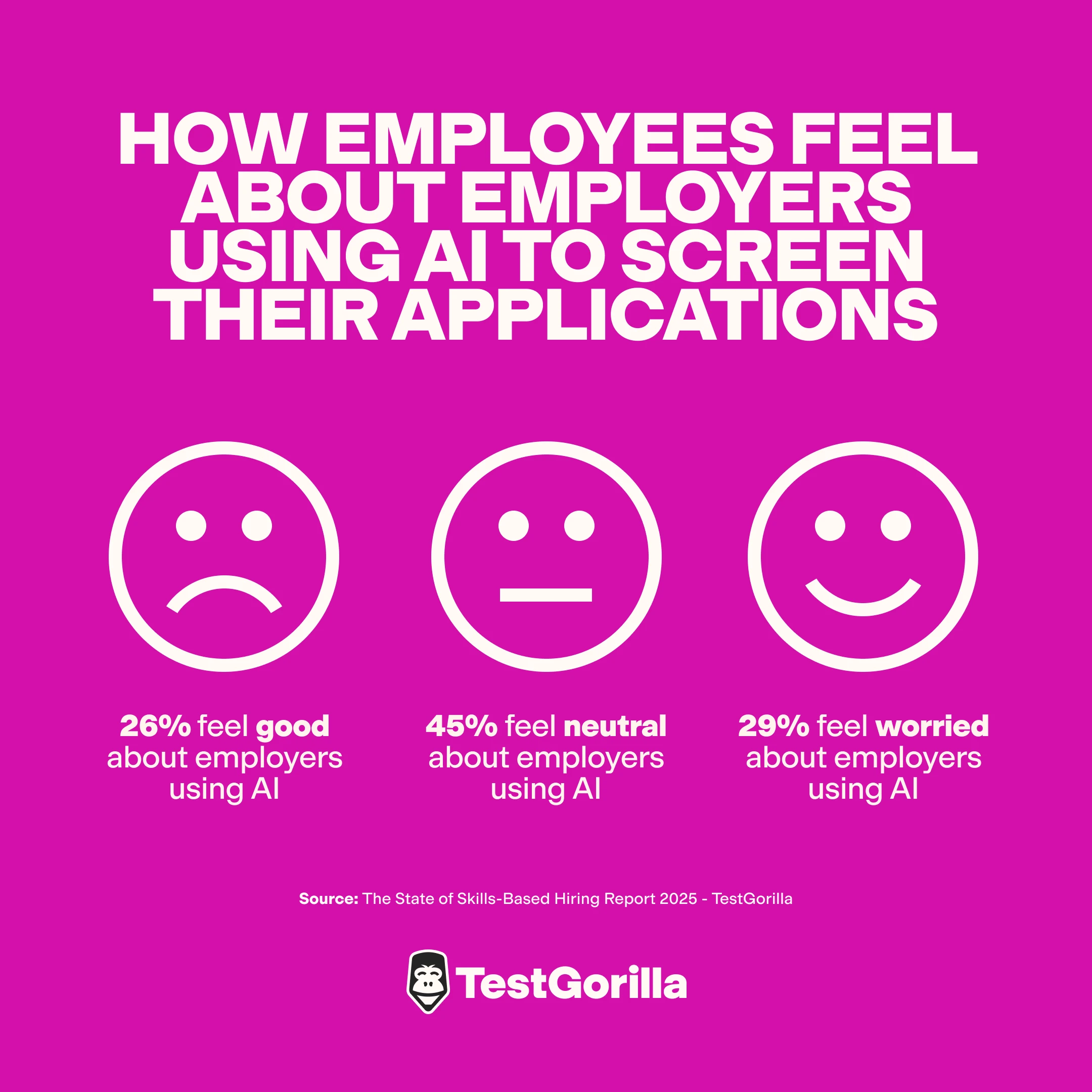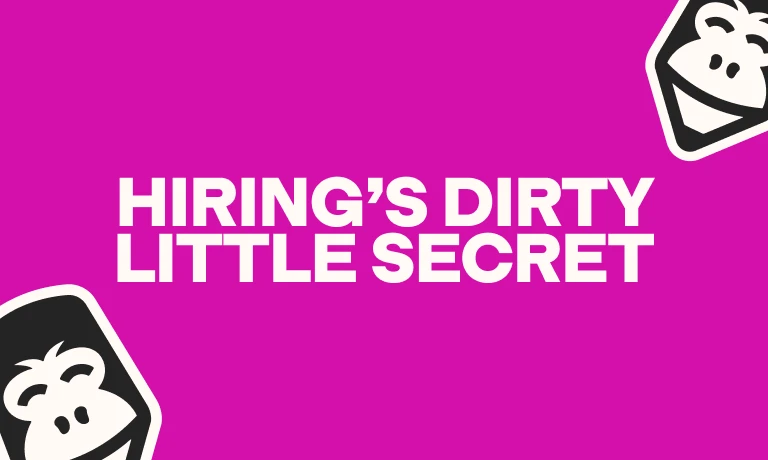AI is taking the world by storm. But HR leaders and recruiters want to know: How exactly is it impacting hiring?
We survey thousands of job seekers and employers every year to bring you The State of Skills-Based Hiring, and this year we asked them questions about AI. I’ve compiled all of the AI-related statistics from our report for you here. Let’s dive in.
7 in 10 have integrated AI
The headlines would have you think that every single company under the sun is using AI somehow. But how many employers have actually integrated it? And how are they using it?
Here’s what our data says:
32% have introduced upskilling initiatives to help their workforce get to grips with AI
38% are hiring for AI skills
More than half (51%) are integrating AI tools into workflows
30% haven’t taken any steps to integrate AI
If you’re one of the 38% hiring for AI-related skills, check out our Artificial Intelligence test. |
When we asked the 30% who haven’t taken any steps ‘why not?’, they cited a combination of reasons. Here’s what they said:
17% don’t know where to start with integrating AI
44% said integrating AI isn’t important for their organization
30% said they’re not integrating AI because of data security and privacy risks
26% aren’t integrating AI because of ethical concerns
32% aren’t integrating AI because of the cost and complexity of it
Whilst the vast majority are using AI, 3 in 10 are not – and some of them have very good reasons not to. It’s worth remembering that AI is more relevant for some industries than others right now. While it’s transforming jobs that rely on computer-based tasks, it’s not so relevant for trade work (like construction, electrical work, or plumbing) that relies on manual labor instead.
How many employers use AI in their hiring process?
What about the hiring process specifically? For starters, 65% of the employers we surveyed overall are using AI in the hiring process. We asked them how and where in the process they use it, and found that:
51% are using AI to source candidates
6 in 10 are using AI to write job descriptions
59% are using AI to screen resumes
2 in 10 are using AI to interview candidates
On top of this, employers who use skills-based hiring are using AI more. Of skills-based hiring employers, 67% use AI in the hiring process (versus only 53% of employers who don’t use skills-based hiring).
Using AI is all well and good – but let’s dig a bit deeper now. For those using it in the hiring process, does it actually bring results?
Is AI improving hiring processes?
Of the 65% who are using AI in their hiring process, 94% told us it’s bringing improvements. Here’s a breakdown of the impact AI is having:
47% say AI has improved their hiring process significantly
47% say AI has improved their hiring process slightly
5% say AI hasn’t really improved their hiring process
>0.5% say AI has made their hiring process worse
It’s almost unanimous that AI, when implemented in hiring, brings improvements. But this is just from the employer perspective.
On the other side of the application process, candidates are using AI too. Employers are noticing a rise in AI-generated resumes:
73% say they’ve noticed a rise in AI-generated resumes
7 in 10 say they’re easy to spot
But how many job seekers are actually using AI to complete job applications? And how do they feel about AI being used to screen their applications?
The best insights on HR and recruitment, delivered to your inbox.
Biweekly updates. No spam. Unsubscribe any time.
How are job seekers using AI?
According to our data:
37% of job seekers are using AI to complete applications
This is less than employers might think, but still makes up a significant portion of candidates. If you’re hiring today, it’s unlikely you wouldn’t receive at least one AI-generated resume.
Are people using AI to cheat?
Beyond resumes, there’s a worry among employers that candidates might use AI to cheat on skills tests. To get to the bottom of this, we asked job seekers some questions about skills tests and AI:
74% have completed skills tests as part of a hiring process
17% admit to cheating on them
70% of those who say they cheat used AI to do so
AI is, of course, presenting candidates with new ways to cheat. Cheaters are, however, in the minority. It’s important to remember that it’s impossible to prevent cheating entirely, and that skills tests are still a valuable addition to the hiring process – even with the risk of cheating.
“People can cheat on assessments very much like they can lie on resumes. The question we should ask isn't "why can't we stop cheating on assessments," but rather: “Do assessments still provide far more value than resumes do?” and “Do they do a better job of predicting job success?” – Gustavo Imhof, Senior Product Manager @ TestGorilla
How do job seekers feel about employers using AI?
We also asked job seekers how they feel about employers using AI to screen their applications. Responses were mixed, with the biggest portion feeling neutral:
26% feel good about employers using AI
45% feel neutral about employers using AI
29% feel worried about employers using AI
To add more colour to this, we found that job seeker sentiments about AI are related to whether they’re using it themselves or not:
Job seekers who are using AI for applications are much more likely to feel good about employers using it (52% vs 11%)
Job seekers who are not using AI for applications are much more likely to feel worried about employers using it (39% vs. 12%)
Head to our report for more data
That’s a wrap on the AI statistics – but there’s far more to the hiring story than this. Head to our report to read more data on the latest trends, challenges, and opportunities shaping the way we work and recruit.
If you’re just looking for more stats blogs, check out the following:
Thanks for reading!
Related posts
You've scrolled this far
Why not try TestGorilla for free, and see what happens when you put skills first.




















